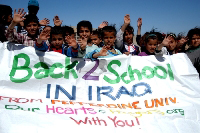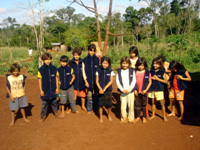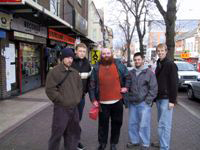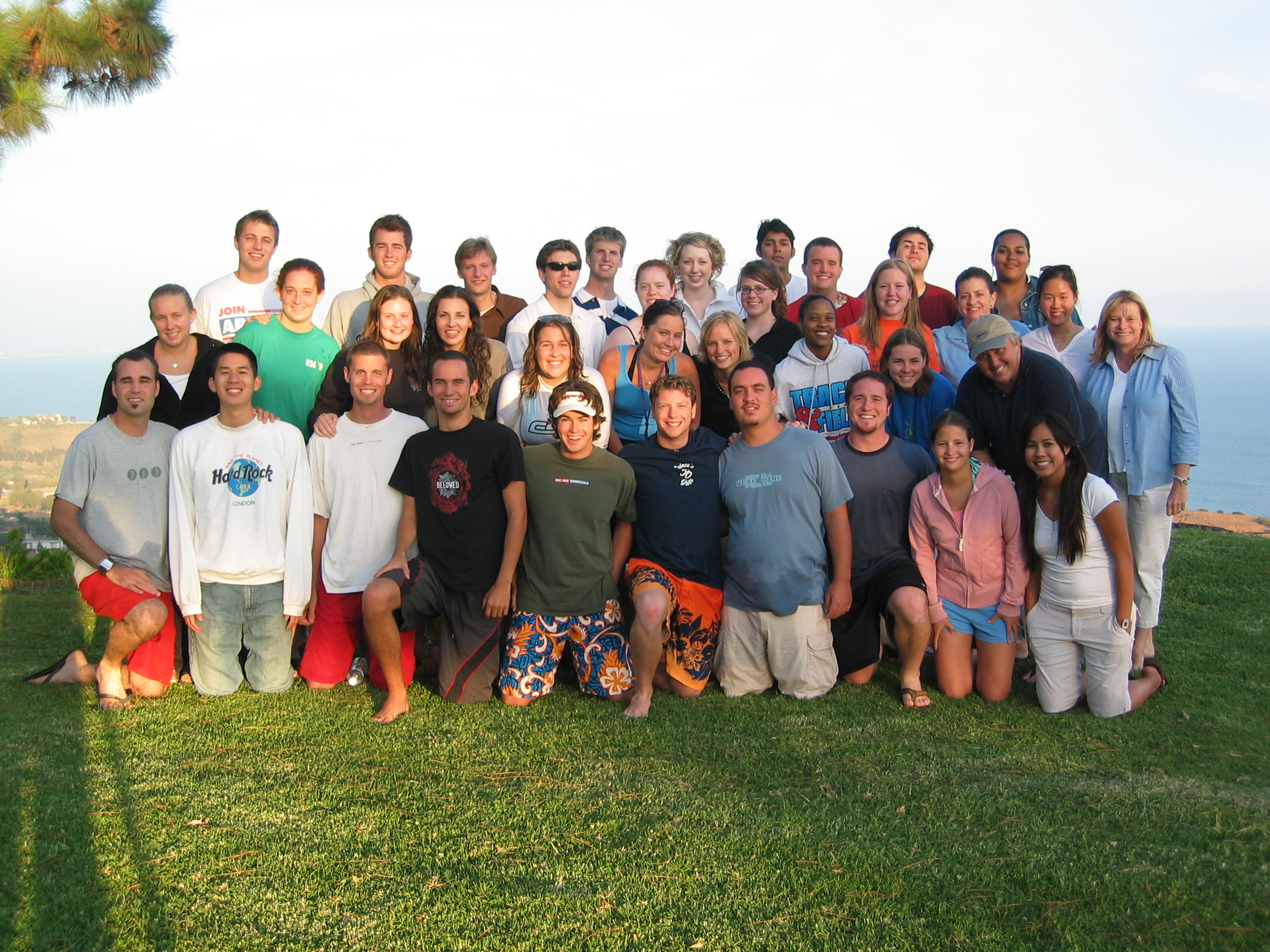The Co-Curricular Component
As the Planning Grant Committee considered the contributions the co-curricular component should make to this project, two questions surfaced time and again. First, which avenues provide the greatest potential for changing and influencing student culture? And second, through which areas of the co-curriculum do students have the greatest opportunity to experience vocational calling while at Pepperdine? With those questions in mind, we focused the co-curricular contribution around three areas: service learning, student leadership, and student ministries.
SERVICE-LEARNING COMPONENT SOLICITS STUDENT PROPOSALS
Most students come to Pepperdine with a strong record of participation in volunteer efforts while in high school. Still, they may not make the connection between their various acts of service and a response to the call of God for their lives. The Pepperdine Voyage hoped to move these students from their point of entry—whatever that point may be—to a full realization that a life of service is their Christian vocation.
 Back 2 School Iraq project, 2004
Back 2 School Iraq project, 2004
No existing Pepperdine structure has been more crucial to the realization of this objective than the Pepperdine Service-Learning/Volunteer Center (PVC), which already sponsors multiple points of entry into the Pepperdine culture of service and volunteer work.
Often students become acquainted with volunteer opportunities during the first week of their freshman year as they participate in the PVC-sponsored Step Forward Day, a program through which faculty, students, and staff "step forward" to give a day of service to the community. Service-learning courses offer another point of entry for many students. These courses involve students in community service on multiple occasions throughout the semester and require a significant reflection component. As a third point of entry, the PVC provides the opportunity for gifted leaders to apply for positions as program coordinators, service-learning advocates, and members of American Humanics—an academic minor that prepares students for work in non-profit organizations. In these positions, students learn about the needs of the organizations with which they are working, coordinate and recruit student volunteers for a given organization, and participate as volunteers themselves.
Through the Pepperdine Voyage, the University offered direction and financial support for a variety of student-led initiatives throughout the initial grant period. Examples include:
- projects that address and/or seek to alleviate poverty and hunger
- projects that address and or seek to promote peace and justice
- projects that serve the community in a variety of ways

We started this project in the first grant because our students developed several vital programs for which they found no university budgetary support. Events such as the national Week of Peace and Justice, National Week of Hunger and Homelessness, and Project Serve offered many opportunities for students to participate in the theological exploration of vocation. The university steadily assumed financial responsibility for many of these programs. The Voyage project, however, continued to help students seek funding for service learning and social action projects and conferences whenever possible. The Service and Social Action program continues through the Center for Faith and Learning.
 Work with the homeless in Belfast
Work with the homeless in Belfast
STUDENT LEADERSHIP COMPONENT CALLS FOR SERVANTHOOD
Through the Pepperdine Voyage, we hoped to communicate to our students that one does not find productive models of leadership in contemporary understandings of success, status, and power. Instead, we wanted our students to discover the model for leadership offered by the cross and by Jesus as he washes the disciples' feet or as he comes as a servant, not as one who is served. We wanted them to understand the biblical paradox that one must lose one's life to find it, and we wanted them to discern the implications that paradox holds for effective leadership. In this way, we hoped that our students would discern their call to leadership as a call to be God's person both in the world and at Pepperdine University.
In keeping with this vision, the Division of Student Affairs created a comprehensive leadership development program. Through this program, we sought to transform our students' understanding of leadership-through-power into an understanding of leadership-through-service.
In creating this program, we especially targeted those students who have the ability to influence and change the prevailing campus culture and who, by virtue of their leadership roles, model servant leadership for their fellow students. We worked especially, therefore, with New Student Orientation (NSO) counselors, Residential Advisors (RAs) and Student Assistants (SAs), Student Government Association (SGA) officers, leaders of various minority organizations such as the Black Student Union (BSU), the Asian student organization, and the Hispanic student organization, Campus Ministry interns, and Volunteer Center (PVC) student coordinators.
The common, campus-wide leadership training day or "Student Leadership Conference" takes place in August before the academic year begins and brings leaders from all departments together to share in a leadership training experience, specifically focused on vocation and calling as it relates to their upcoming leadership experience.
Another facet of the Leadership program brings leaders together again for a common experience in the form of a monthly Leadership Lunch Colloquium. The lunch series engages student leaders in the exploration of leadership as vocation through leadership themes found in the Social Change Theory of Leadership Development. Our student leaders, in turn, help shape the campus climate and create conversation among peers.
For more information on the Student Leadership program, contact Student Affairs.
STUDENT MINISTRIES DIMENSION BRINGS SLAS/SLCS TO RESIDENCE HALLS
The Pepperdine Voyage provided funding and support for the Spiritual Life Advisor (SLA) program, established in 2000. This program annually places students in undergraduate residence halls to provide pastoral care in their capacity as Spiritual Life Advisors.
 2004-05 SLAs
2004-05 SLAs
This program allows our students to witness examples of faith, courage, and vocation among their peers as SLAs reach out to residential students who need prayer, consolation, or a consistent witness of faith. In addition, it allows the SLAs to gain an understanding of their gifts and to experience Christian service at the crossroads of life where crises—sometimes involving life and death decisions—can occur. This program, therefore, is an excellent vocational proving ground for students interested in ministry.
The SLA program began with 14 students, allowing Seaver College to place one student in each freshman hall and in some of the residence halls for upperclassmen. When the University received applications for the 2001-2002 academic year, however, the number of students interested in this ministry had more than doubled. Accordingly, the Student Ministries Office selected twenty-six SLAs for that year. With this level of interest, there is now an SLA in every undergraduate residence hall and apartment complex.
In addition, six students serve as Spiritual Life Coordinators (SLCs) and, in that capacity, help coordinate both resources and the SLA volunteers. These students are either graduate students in religion and/or students with experience as SLAs.
In order to provide adequate levels of training, the Office of Student Ministries holds a two-day retreat for both SLAs and SLCs at the beginning of each academic year.
For more information on the SLA/SLC program, contact Travis Weber in the Housing and Residence Life and Community Living[BROKEN LINK] office.